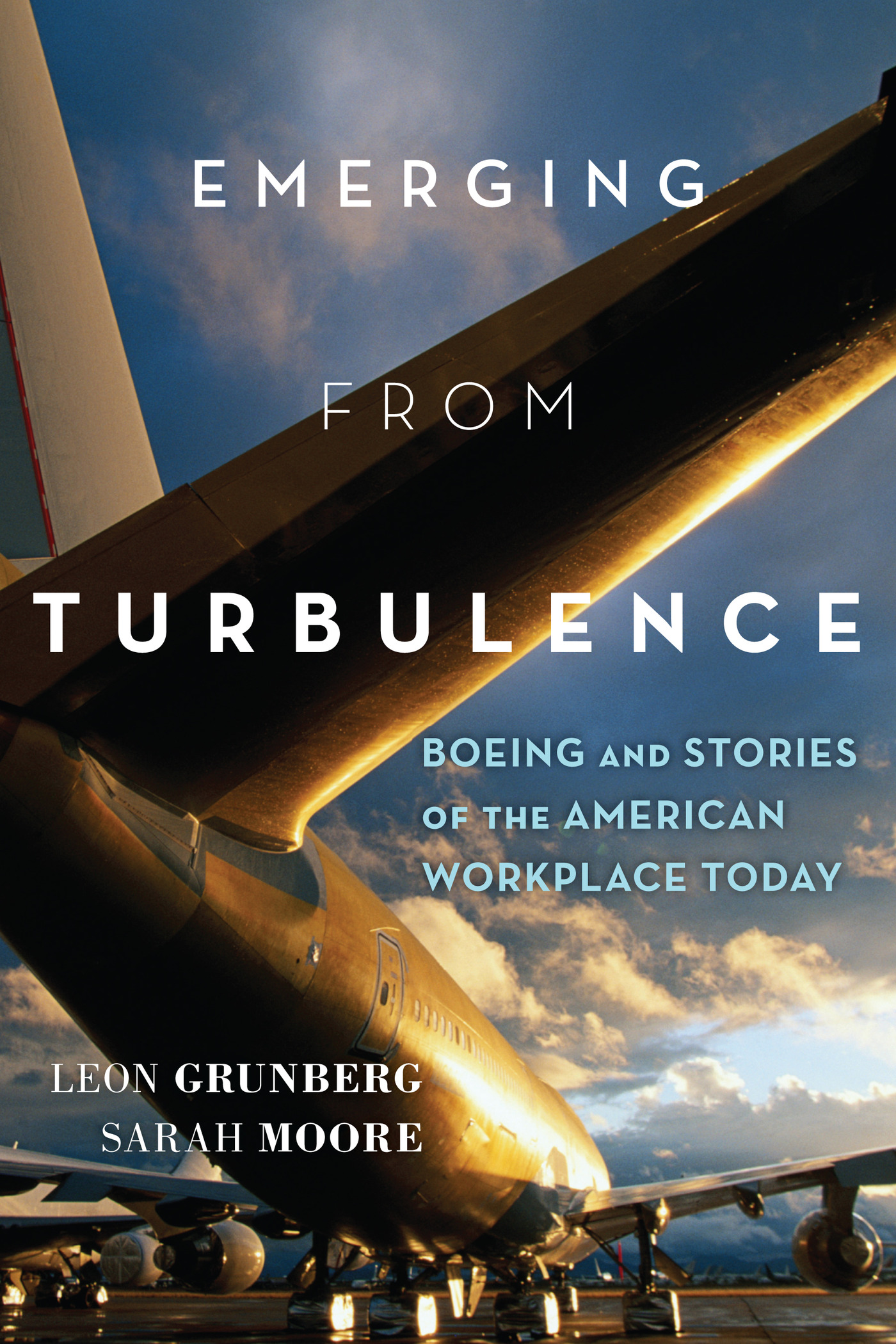Emerging from Turbulence
Boeing and Stories of the American Workplace Today
Leon Grunberg and Sarah Moore
ROWMAN & LITTLEFIELD
Lanham Boulder New York London
Published by Rowman & Littlefield
A wholly owned subsidiary of
The Rowman & Littlefield Publishing Group, Inc.
4501 Forbes Boulevard, Suite 200, Lanham, Maryland 20706
www.rowman.com
Unit A, Whitacre Mews, 26-34 Stannary Street, London SE11 4AB,
United Kingdom
Copyright 2016 by Rowman & Littlefield
All rights reserved. No part of this book may be reproduced in any form or by any electronic or mechanical means, including information storage and retrieval systems, without written permission from the publisher, except by a reviewer who may quote passages in a review.
British Library Cataloguing in Publication Information Available
Library of Congress Cataloging-in-Publication Data
Grunberg, Leon.
Emerging from turbulence : Boeing and stories of the American workplace today / Leon Grunberg and Sarah Moore.
pages cm
Includes bibliographical references and index.
ISBN 978-1-4422-4854-0 (cloth : alk. paper) ISBN 978-1-4422-4855-7 (electronic) 1. Boeing Company. 2. Aircraft industryUnited StatesManagement. 3. Aircraft industryUnited StatesEmployees. I. Moore, Sarah, 1965 II. Title.
HD9711.U63B63294 2016
338.7'629130973dc23
2015022612
 TM The paper used in this publication meets the minimum requirements of American National Standard for Information Sciences Permanence of Paper for Printed Library Materials, ANSI/NISO Z39.48-1992.
TM The paper used in this publication meets the minimum requirements of American National Standard for Information Sciences Permanence of Paper for Printed Library Materials, ANSI/NISO Z39.48-1992.
Printed in the United States of America
Acknowledgments
Our research on Boeing began some twenty years ago when we approached the company with the request that it let us study how the workforce would respond to corporate change. We had no idea that the changes would be so deep, ongoing, and widespread or that we would be fortunate to study Boeing for such a long period of time during which it was radically transformed. It still produced amazing airplanes, but how and where the airplanes were designed, manufactured, and assembled changed significantly, along with its company culture and identity. Focusing on the first decade of the transformation, we documented with longitudinal, quantitative data, collected from thousands of employees, why and how Boeing changed and with what consequences for the employees. Our findings can be found in many academic papers and in Turbulence: Boeing and the State of American Workers and Managers (2010). In this new book, we want the aftermath of that decade of change to be told in the words of the employees, not only because they have value in themselves but also because we believe the stories will resonate with many other workers and managers employed across a wide swath of the American economy.
Returning to ask employees who participated in our research for so many years to once again take the time to answer our questions depended heavily on their generosity. We are profoundly grateful that so many of them have trusted us enough and thought our endeavor sufficiently worthwhile to help us again. We are also delighted that new, and mostly younger, Boeing employees found the project interesting and worth contributing to. Although their identities are disguised and we cannot thank them by name, we owe the thousands of employees who helped us a great debt. We hope we have done justice to their stories.
We are also grateful to the National Institute of Alcohol Abuse and Alcoholism of the National Institutes of Health for funding the first phase of our study and to The Boeing Company for giving us access to dozens of managers and thousands of workers who participated in the research. Local 751 of the International Association of Machinists and Aerospace Workers (IAM) and the Society of Professional Engineering Employees in Aerospace (SPEEA) also gave us access to their membership so that we could conduct the most recent phase of the study. The cooperation of the unions has been invaluable. We thank Stan Sorscher and Ed Lutgen for their support of the project and help in facilitating our connection with the unions.
A very special thanks also goes to Ed Greenberg, who helped launch and nurture this project from its inception and who was an inspiring collaborator on all phases of the study and on nearly everything weve written on the Boeing story. Only distance and time have prevented him from collaborating fully on this book. His perceptive comments on the manuscript have greatly improved the final outcome. We also wish to thank Pat Sikora, another outstanding colleague who was part of our research team during earlier phases of the project.
Interviewing so many individuals required a team of dedicated assistants. We were fortunate that Kristen Ching, Mackenzie Fuentes, and Sarah Leonard displayed the sensitivity and empathy to gain the cooperation and trust of those they interviewed. We struck gold with Emily Sterling. She conducted many of the interviews and developed remarkable rapport with employees of all ages. Her open, down-to-earth personality and her exceptional probing skills elicited some very revealing interviews. She is truly a gifted interviewer.
In addition to the University of Puget Sound for financial and sabbatical support and Reggie Tison for excellent administrative assistance, we are grateful to the many friends, relatives, and colleagues who read the entire manuscript and provided insightful suggestions. These include David Smith, Cooper Sherry, Michael and Suzanne Moore, Elizabeth Hirschl, Dawn Rodin, and Sarah Anne. Emma Grunbergs editorial suggestions were exceptionally astute and clarified and sharpened our writing. Of course, we are responsible for any remaining errors. For his contributions during initial phases of the 2013 survey construction and background work, we wish to thank colleague Alan Krause. Finally, over the many years of this project, we have also benefited from the support and encouragement of our colleague and friend Sunil Kukreja and from our spouses, Sonia Grunberg and Cooper Sherry.
Chapter 1
Boeings Transformation and
Americas New Social Contract
When I say I changed the culture of Boeing, that was the intent, so its run like a business rather than a great engineering firm. It is a great engineering firm, but people invest in a company because they want to make money.
Harry Stonecipher, 2004, former CEO of The Boeing Company, reflecting on the late 1990s
They have changed my attitude to be why should I care and to look out for myself as management wont. Also, Boeing is no longer a premium company to work for. If I can find somethinganythingsomewhere else, Im gone. They got no loyalty to me, why should I have any to them?
Technical employee, twenty-three years at Boeing,
interviewed in 2006
This is no longer your fathers company! That was the pointed proclamation a top executive reportedly made to Boeing employees shortly after the company merged with McDonnell Douglas in 1997. Newly installed company leaders were intent on boosting financial performance by shaking the workforce out of its cozy, laid-back ways. The message to employees was that they should let go of the past and come to terms with the new corporate reality. A new governing ethos, some say imported from McDonnell Douglas, would focus on minimizing risk and improving shareholder returns. The changes would also shake the working lives of employees and profoundly affect their relationship with their company.
Next page
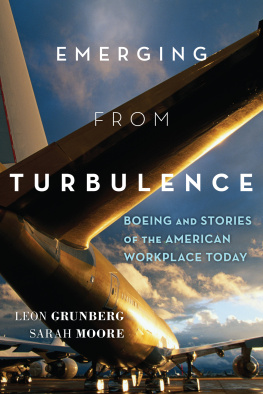
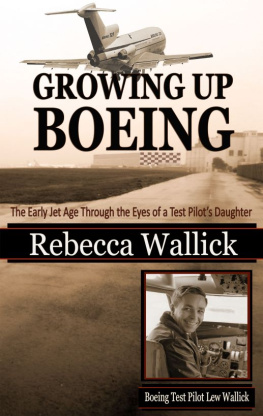
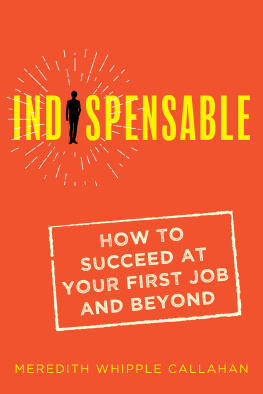
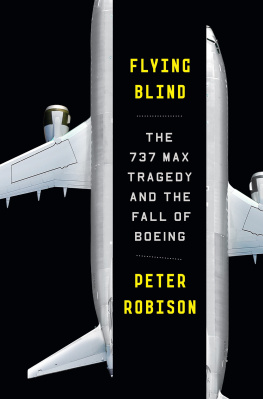

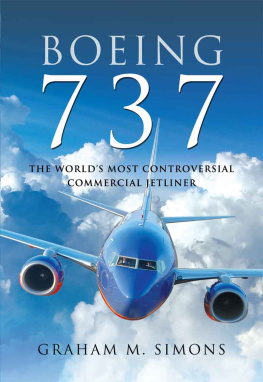
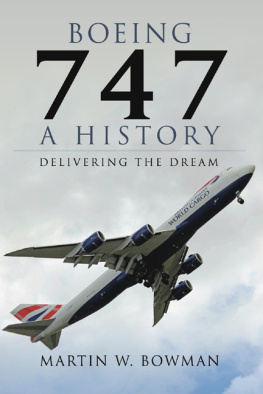

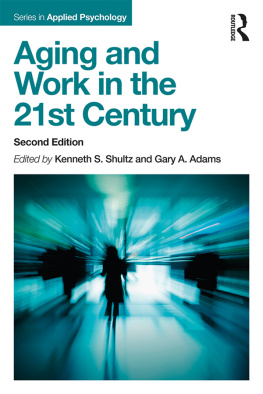
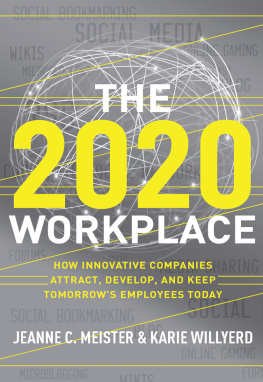
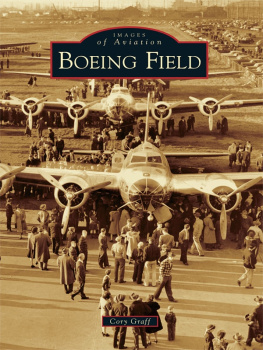
 TM The paper used in this publication meets the minimum requirements of American National Standard for Information Sciences Permanence of Paper for Printed Library Materials, ANSI/NISO Z39.48-1992.
TM The paper used in this publication meets the minimum requirements of American National Standard for Information Sciences Permanence of Paper for Printed Library Materials, ANSI/NISO Z39.48-1992.